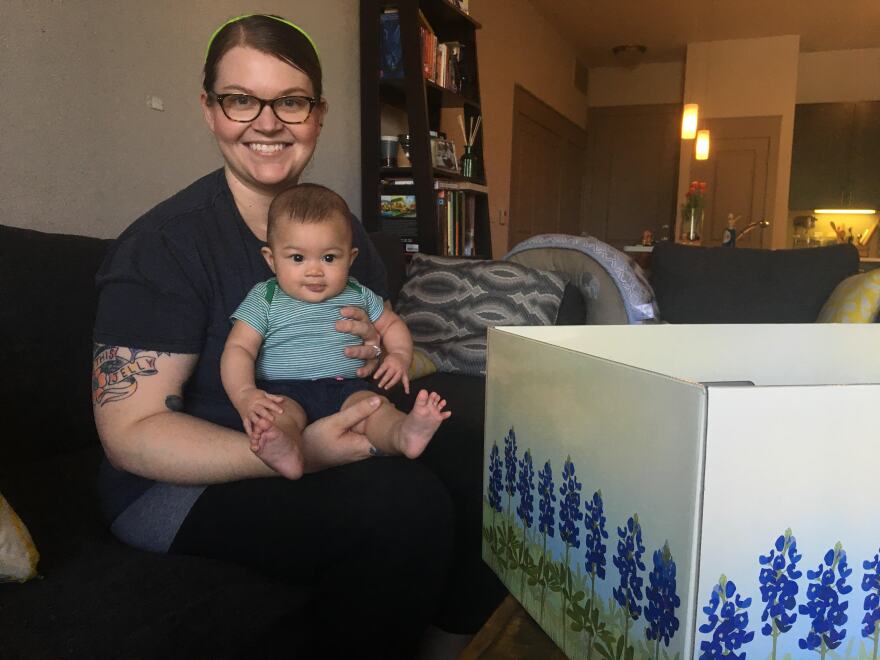Across the country, new babies are sleeping in cardboard boxes. It might sound strange, but the boxes are part of a larger initiative to lower the infant mortality rate. So far, more than a million "Baby Boxes" have been distributed across the world.
This month, the company behind the boxes launched in Texas, where it plans to hand out 400,000 boxes this year. Soon, new parents in Texas could be unpacking boxes instead of fancy bassinets.
'Bassinets without legs'
Around 8:30 p.m. every night, Taylor Freed places her baby, Penelope, on her back into a cardboard box with a printed bluebonnet border. Penelope is a smiley 4-month-old, who's passionate about blowing bubbles. Freed, who lives in a one-bedroom apartment in Dallas, got the box for free after taking an online course about how to get babies to sleep safely.
“It came with some wipes, some breast feeding stuff, some diapers and a little onesie, too, that on the front of it reminds you always have [the babies] sleep on their backs so it's safe,” Freed says.
Across the country, more than 3,500 babies died unexpectedly and suddenly in 2015. In Texas, the infant mortality rate is below the national average, around 5.8 deaths per 1,000 live births, but there are big differences among ethnic groups. And in certain cities areas — like Fort Worth — the rate is much higher.
One of the most common ways babies die is by accidental suffocation — being smothered by sleeping too close to parents, pillows, soft toys or blankets. The idea behind the boxes is to remove all those objects and promote safe sleep — cheaply — for all moms.

Getting Americans on board
Jennifer Clary, the co-founder and CEO of Baby Box Co., is a Dallas native. “Baby boxes are essentially durable cardboard bassinets without legs,” she says.
Clary first heard about baby boxes in a news story highlighting the success of Finland’s baby box program, which is more than 75 years old. There, infant mortality rates are among the lowest in the world. In 2013, Clary and a friend, also from Dallas, founded the Baby Box company and began partnering with hospitals to distribute boxes to new moms in states like New Jersey, Ohio and Alabama. In May, they launched in Texas.
“We had to be very careful entering the Texas market because it is the largest state to date,” Clary says. “To give you a comparison, there’s 105,000 births in New Jersey annually and there’s almost 400,000 in Texas each year.”
In North Texas, the company is working with a handful of hospitals. The challenge in the U.S., Clary says, has been familiarizing people with the concept.
“In the U.S.,” Clary says. “Parents are kind of like 'Why would I put my baby in a box?'”

In Alabama, which has one ofthe highest infant mortality rates in the nation, pediatrician Cathy Wood says people had other questions.
“‘What if the cat gets in the box? Or what if someone puts a baby in the box and puts a top on it?,’ things like that,” Wood says.
Wood says it would be ideal if everyone could have a crib at home, "but that’s not where we live."
“The idea of putting a baby in a safe location is a good one,” Dr. Harvey Karp says, “But the idea that putting them in a box is going to dramatically reduce infant sleep death is overly simplistic.”
Karp is author of the best-selling series of parenting books, "The Happiest Baby." He points to a study done in Wisconsin where three-quarters of the babies who died unexpectedly did have a safe sleeping surface available.
“They had a bassinet or Pack 'n Play in the home but they did not use it the time the baby died,” Karp says. “The reason is because you're exhausted, you tend to bring the baby in bed with you, and that’s where most of the tragedies happen.”
In Texas, the infant mortality rate is below the national average, around 5.8 deaths per 100,000 births.
Educating parents
The American Academy of Pediatrics hasn’t endorsed baby boxes, citing insufficient data. Baby Box Co. CEO Jennifer Clary says peer-reviewed research studies are underway.
“Baby boxes are not magical,” she says. “There is no unilateral product you can distribute to parents that will keep your child safe in the absence of understanding and education.”
Clary’s company makes all the education and boxes available for free and makes money only if people buy products on its online store. In Bexar County, health care workers aren’t focused on the box or the products, but the education.
Dr. Amy Quinn is a neonatologist with the University Health System in San Antonio, which launched a pilot Baby Box project last year.
“We know across the state [that] Bexar county has one of the highest incidences of sudden infant death syndromes,” Quinn says.
There is no unilateral product you can distribute to parents that will keep your child safe in the absence of understanding and education.
After follow-up interviews with new moms who took the boxes home, Quinn and her colleagues decided to continue the program.
“It’s not just about putting a baby in a box. It is about providing a safe environment if that is what’s necessary and needed and it is truly about the educational push,” she says.
As for what to do with the boxes once a baby outgrows them, they’re recyclable. But Dallas mom Taylor Freed has other plans.
“My dog seemed pretty interested in it,” Freed says, laughing.
That’s right, after baby Penelope uses it, her Pomeranian "Pooka" might just get to take a nap in the box, too. Getting Pooka to sleep on her back — that might be a challenge.







